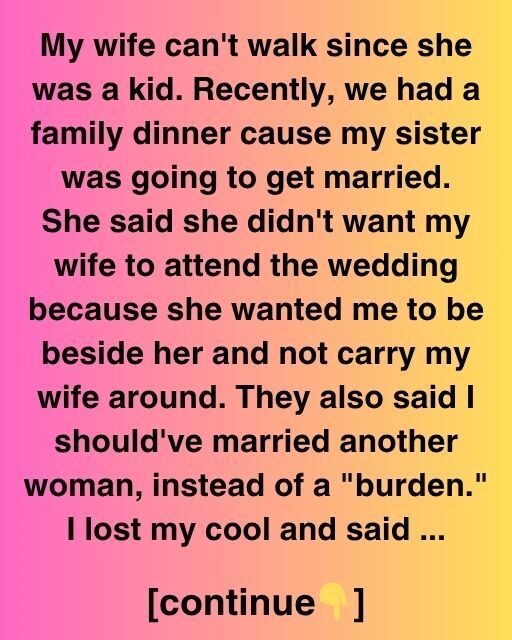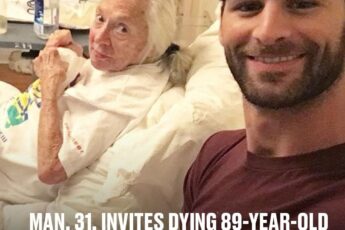“My wife hasn’t been able to walk since childhood. Recently, we had a family dinner to celebrate my sister’s upcoming wedding. It was supposed to be a joyful evening, full of laughter and excitement as we planned for the big day. The table was set beautifully, with candles flickering in the center and the smell of roasted chicken and garlic bread filling the air. Everyone was chatting, clinking glasses, and sharing stories. My wife sat beside me in her wheelchair, smiling warmly, doing her best to feel included even though I could sense her usual quiet hesitation around my family. She has always been gentle and patient, never wanting to be a source of tension, even when comments were made that cut deeper than people realized.
During the evening, though, something happened that shifted the entire mood of the night. My sister, the bride-to-be, turned to me in front of everyone and said she didn’t want my wife at the ceremony. Her reasoning? She claimed she wanted me by her side on her big day, not “carrying her around.” The words dropped heavy and cold, slicing through the air like a knife. My wife’s smile faltered, and she looked down at her plate. In that moment, I felt my chest tighten, my ears ring. I couldn’t believe what I had just heard.
And then, as if that wasn’t cruel enough, someone else at the table chimed in—another relative, their voice sharp and casual, as though they were just stating a fact. They said I should’ve married someone else instead of what they called a “burden.” That single word echoed in my head, over and over, like a bell I couldn’t silence. A burden. That’s what they chose to call the woman who has been my partner, my confidant, and the very source of my happiness. My wife sat still, her hands trembling slightly, but she said nothing. That was always her way—to absorb the hurt rather than lash out. But I couldn’t stay quiet. Not this time.
I lost it. The anger surged so quickly it almost felt like my body moved on its own. I stood up, my chair scraping loudly against the hardwood floor. Every eye turned toward me, but I only saw my wife—her eyes filled with hurt, though she tried to hide it. My voice shook, but it was strong enough to cut through the suffocating silence. I said, “My wife is not a burden. She’s the best thing that’s ever happened to me. If she’s not welcome, then neither of us will be at your wedding.”
The room went completely silent. It wasn’t the kind of silence filled with peace, but the heavy, stunned kind that follows a lightning strike. I heard the soft clink of a spoon falling onto a plate—my mother’s. It was such a small sound, but it seemed to echo louder than anything else in the room. My sister’s face turned beet red, her mouth opening and closing as though she was searching for words she couldn’t find. When she finally managed to stammer, it was a weak attempt at justifying herself, muttering something about wanting her day to be “perfect” and “uncomplicated.” But the excuses were hollow. I was too angry to listen.
Without saying another word, I bent down and gently helped my wife into her wheelchair. She avoided everyone’s gaze, her cheeks flushed with embarrassment and pain. I could see her blinking quickly, trying to keep tears from falling, and that only fueled my rage even more. I placed my hand firmly on the handles of her chair, my decision made. We were leaving.
As I pushed her toward the door, I heard whispers ripple across the table. Muffled voices, some shocked, some judgmental, and maybe even a few sympathetic—but none of it mattered. Not a single word reached me. All I felt was a storm of rage boiling inside me, mixed with a deep, aching sadness. Sadness that the people I had grown up with, the family I thought would always have my back, could be so callous toward the woman I love.
We stepped out into the cool evening air, and I took a deep breath, though it did little to calm me. My wife placed her hand on mine, a soft squeeze that told me she understood, that she was grateful I had stood up for her. But beneath her gratitude, I could feel the weight of her hurt. She didn’t deserve this—not tonight, not ever. She deserved to be cherished, to be treated with the respect she had always given others.
As we made our way to the car, I couldn’t shake the heaviness pressing on my chest. I knew, in that instant, that this decision—choosing her over them, standing up for what was right—would fracture my relationship with my family in a way that might never fully heal. Holidays might be quieter, phone calls fewer, and bonds that once seemed unbreakable now felt fragile. But I also knew I couldn’t let them speak about her that way. Love is not about convenience or appearances—it’s about loyalty, respect, and unwavering commitment.
And my wife? She is not a burden. She never has been, and she never will be. She’s the strongest, most resilient person I know. She’s the one who makes me laugh when I’ve had the worst day, the one who encourages me when I doubt myself, the one who makes every moment of my life richer simply by being in it. Walking away from that dinner wasn’t just about leaving behind an uncomfortable situation—it was about making it clear, once and for all, that my marriage, my love, and my loyalty to her will always come first. Even if it means losing everything else.






